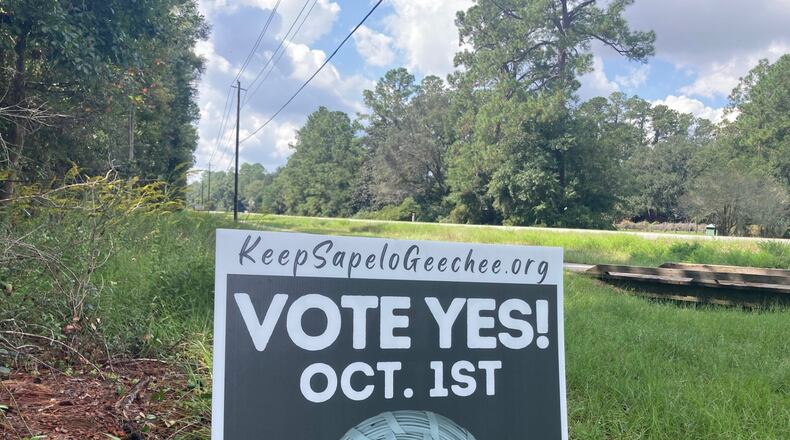DARIEN ― Voters have cast 624 early ballots in a referendum to determine the size of beach homes allowed on Sapelo Island, site of one of the last Gullah Geechee communities on the East Coast.
But a judge is expected to rule Monday on whether the scheduled Oct. 1 special election will continue.
Judge Gary McCorvey heard arguments Friday morning in a court challenge to the legitimacy of the referendum. The ballot initiative gives voters the opportunity to repeal a zoning ordinance passed by the McIntosh County Commission last September that allows for bigger homes — up to 3,000 square feet — on the oceanfront island.
Sapelo’s three dozen or so Gullah Geechee residents, who live in a 34-acre community known as Hog Hammock, make up the majority of the island’s full-time residents. They are descendants of enslaved West Africans who worked the island’s plantations prior to emancipation and the Civil War. Over the years, Hog Hammock properties have been bought by non-descendants, and many Gullah Geechee fear the zoning change will lead to unchecked development. Almost all of Sapelo beyond Hog Hammock is a protected wildlife refuge owned by the state.
Credit: Brian Brown/Vanishing Georgia
Credit: Brian Brown/Vanishing Georgia
Sapelo residents initiated the push for the referendum in late 2023, collecting more than 2,300 signatures on petitions circulated throughout the county. The support was enough to prompt McIntosh County Probate Judge Harold Webster to order the special election under a provision of the Georgia constitution that gives citizens a process to challenge legislation enacted by local governments.
The McIntosh commissioners filed a lawsuit over Webster’s ruling in July. The county argues the constitutional provision, known as the home rule, does not apply to zoning changes, noting that property standards are addressed in another part of the Georgia constitution.
The lawyer representing the county, Ken Jarrard, on Friday described the referendum as an illegal election that the county should not be funding. Early voting began on Sept. 9.
McCorvey opened the legal proceedings by saying he would not issue a ruling from the bench at the end of the hearing and would instead take the weekend to review case law and the attorneys’ argument. McCorvey is a semiretired judge from southwest Georgia with senior status, meaning he can preside over cases with special circumstances.
McCorvey was assigned the Sapelo case because of the local probate judge’s involvement. Webster is named as a defendant in the lawsuit and works alongside the area’s Superior Court judges, creating the potential for a conflict of interest if one of them were to hear the case.
Credit: AP
Credit: AP
In addition to saying he would not rule immediately, McCorvey also repeatedly told attorneys defending the referendum that they “had a hard hill to climb” to convince him that the Georgia constitution allowed for the election. He also voiced his belief that his ruling in the case would be appealed all the way to the Georgia Supreme Court.
The judge’s frankness did not dissuade Savannah attorneys Dana Braun and Phillip Thompson, the same lawyers who defended the legality of the Camden County Spaceport referendum held in 2022 in a case that reached the state’s highest court. Thompson told McCorvey that as part of the Georgia Supreme Court’s spaceport decision, which upheld the referendum as legal, Justice Charlie Bethel noted in a concurring opinion that the state constitution’s home rule provision could be used to challenge zoning ordinances in the future.
“The home rule clause reads ‘ordinances, resolutions and regulations’ and it absolutely applies because zoning is an ordinance,” Thompson said. “The referendum power applies to all uses of legislative powers.”
Credit: Adam Van Brimmer
Credit: Adam Van Brimmer
More than a dozen Sapelo Gullah Geechee residents attended the hearing. Most came away voicing cautious optimism that McCorvey will allow the election to continue despite the judge’s challenging of the defense attorneys.
“I’m hopeful that we will prevail based on the right of voters to challenge this action,” said Josiah “Jazz” Watts, one of the leaders of the petition drive that triggered the referendum. “It didn’t sound too good for us starting out, but once our lawyers started making their arguments, I got the sense the judge was listening and that he was open to our side and our focus on the law.”
About the Author
Keep Reading
The Latest
Featured





